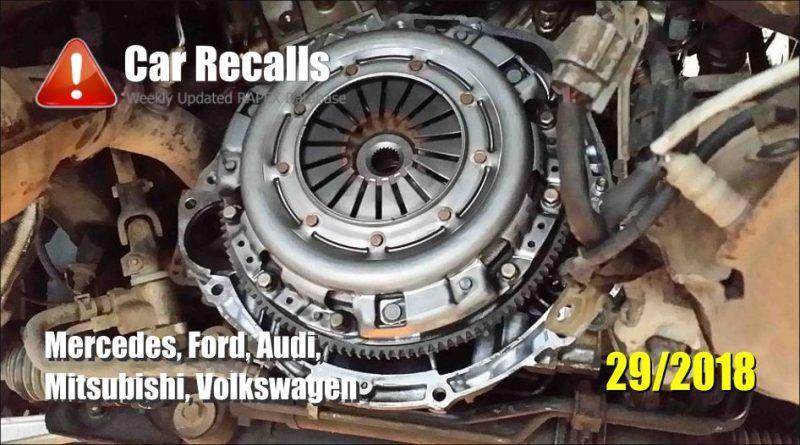11 models of 5 manufacturers were recalled at the 29th week of 2018 through the Rapex system. Ford, Mercedes-Benz, Mitsubishi, Volkswagen and Audi announced one recall each.
Ford has recently been dealing with a quite serious problems through its recalls. In February, the vehicles from the years 2010 to 2014 equipped with 1.6 Ecoboost engines were recalled because of the risk of cylinder head cracking – we wrote here. In March, a recall was announced for the cars produced between 2014 and 2015 with 2.0 litre Duratorq engines, due to the risk of overheating and subsequent damage to the oil sump – we wrote here.
At the 29th week of 2018, Ford announced another recall through the Rapex system. This time concerns the C-Max, Focus, Kuga, Mondeo, Galaxy and Transit Connect models produced between 2014 and 2018, on which the clutch pressure plate may break.
PSA Group
A similarly widespread and long-term problem, but this time with the front wiper motor, is announced by the PSA Group. With a corrosion and subsequent wiper motor failures are suffered the Peugeot 4007 and Citroën C-Crosser produced between 2007 and 2012, as well as the Mitsubishi ASX from the years 2010 to 2017 – we wrote here. The same problem is now reported with the Mitsubishi Outlander (2005-2012).
Mercedes-Benz
Last month, the Mercedes-Benz recalled the C-Class and E-Class models produced from August 2017 to February 2018 due to poorly welded backrests of the driver and passenger seats – we wrote here. Now it appears that a similar problem occurs also on seats in cars made a little earlier – from April to August 2017. The front seatbacks may not be fully secured on its right side.
Volkswagen, Audi
Problems are not avoided either by the Volkswagen Group this week. For the Tiguan Allspace with the production date from August 2017 to January 2018, the right and left front axle nuts might not have been tightened properly. With this year’s Audi Q5 (April – May 2018), the individual pistons of the rear wheel brake don’t have to work as expected. This could lead to a delayed braking effect and an increased risk of an accident.
-rb-
